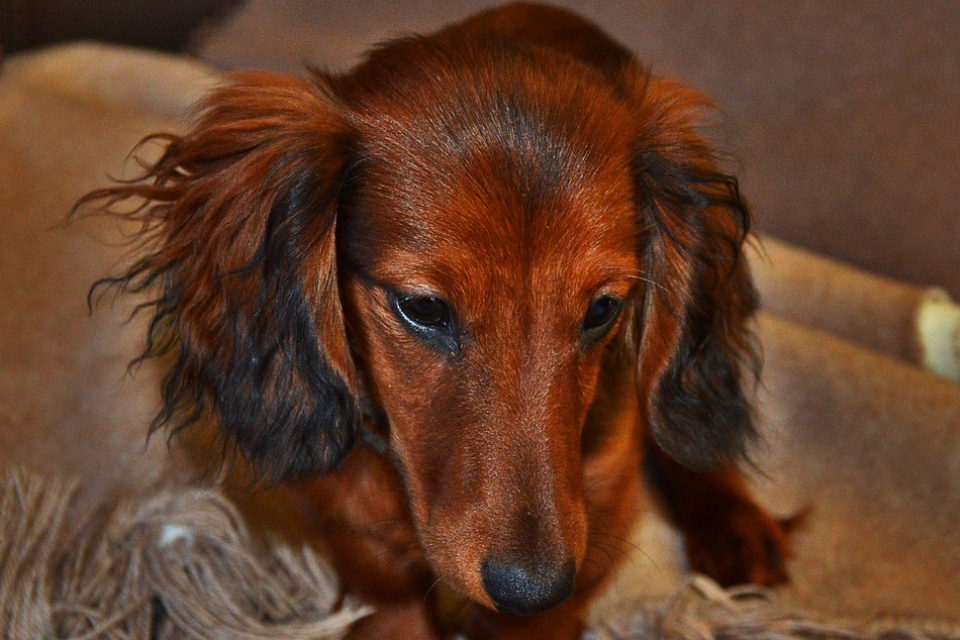Miniature dachshunds are a beloved breed among dog owners for their cute looks, playful personalities, and loyal nature. As an owner of several miniature dachshunds over the years, I have seen firsthand how these dogs can bring so much joy and love into our lives. However, there is a common misconception that miniature dachshunds are naughty or difficult to train, which can sometimes discourage potential owners from considering them as a pet.
In this blog post, we will delve into the question of whether miniature dachshunds are truly naughty or not. We will examine their history and origins, physical and personality traits, and factors that may influence their behavior. We will also explore common behaviors that are often associated with the breed, and offer practical tips for managing and preventing naughty behavior in your miniature dachshund.
Whether you are a current owner of a miniature dachshund, considering adopting one, or simply curious about this breed, this blog post will provide valuable insights into their behavior and offer helpful advice for keeping your furry friend happy and healthy.
Key Takeaways:
- Miniature dachshunds can exhibit naughty behavior, but it’s important to understand the factors that influence their behavior.
- Effective management of naughty behavior can include training, socialization, and establishing boundaries.
- With the right approach and understanding, you can enjoy a happy and well-behaved miniature dachshund.
Understanding miniature dachshunds
Miniature dachshunds are a unique and charming breed that have been popular pets for decades. These small dogs were originally bred in Germany to hunt badgers and other small animals, and were prized for their bravery, determination, and tenacity. Over time, they have become popular pets due to their affectionate nature, playful personality, and adorable looks.
One of the most distinctive physical features of miniature dachshunds is their long, low-slung body, which was originally designed to help them navigate underground burrows while hunting. They come in a variety of colors and patterns, including black and tan, red, chocolate, and dapple. Their coat can be smooth, wire-haired, or long-haired, each with unique grooming requirements.
Personality-wise, miniature dachshunds are known for being loyal and affectionate to their owners, but can also be stubborn and independent. They are typically very playful and enjoy chasing toys or playing with other dogs, but can also have a strong prey drive that may cause them to chase after small animals or bark excessively. As with any breed, it is important to understand and appreciate their unique personality traits in order to train and care for them properly.
When it comes to training, miniature dachshunds can be challenging for some owners due to their stubborn nature. However, with patience and consistency, they can be trained to follow basic obedience commands and even learn more complex tricks. Positive reinforcement training is often the most effective method, as these dogs respond well to praise and rewards.
In addition to training, socialization is also an important factor in shaping a miniature dachshund’s behavior. Introducing them to new people, animals, and environments at a young age can help them become more confident and well-behaved. Without proper socialization, they may become anxious or aggressive in unfamiliar situations.
As a longtime owner of miniature dachshunds, I have found that understanding their unique traits and needs is key to ensuring their happiness and well-being. By providing them with plenty of exercise, socialization, and positive reinforcement training, these charming little dogs can make wonderful and loving companions for many years to come.
Related: Are Mini Dachshunds Smart?
Are miniature dachshunds naughty?
One of the most commonly asked questions about miniature dachshunds is whether they are naughty. The short answer is yes, they can be naughty at times, but this behavior is usually a result of their breed characteristics and their environment. Here are some of the reasons why miniature dachshunds can be considered naughty:
- Stubbornness: Miniature dachshunds are known for their stubbornness, which can make training them challenging. This stubbornness can also lead to them ignoring commands or misbehaving.
- Barking: Miniature dachshunds can be very vocal, and they often bark at anything that catches their attention. This can include other dogs, people, or even objects. While barking is a natural behavior for dogs, excessive barking can become a nuisance.
- Separation anxiety: Miniature dachshunds are known for being very attached to their owners, which can lead to separation anxiety when left alone. This anxiety can cause them to engage in destructive behavior, such as chewing on furniture or shoes.
- Hunting instinct: As a breed originally bred for hunting, miniature dachshunds have a strong prey drive. This drive can lead them to chase after small animals, such as squirrels or rabbits, or to dig up gardens and yards.
It’s important to remember that while these behaviors can be frustrating, they are not necessarily the result of a naughty dog. Instead, it’s important to provide your miniature dachshund with proper training and socialization to help them learn appropriate behaviors. Here are some tips for managing naughty behavior in miniature dachshunds:
- Consistency: It’s important to be consistent in your training and rules for your miniature dachshund. This means enforcing boundaries and commands every time, and not letting them get away with naughty behavior.
- Positive reinforcement: Rather than punishing naughty behavior, focus on rewarding good behavior with treats or praise. This will help your miniature dachshund learn what behaviors are acceptable.
- Exercise: Providing your miniature dachshund with plenty of exercise and playtime can help reduce naughty behavior caused by boredom or excess energy.
- Socialization: Socializing your miniature dachshund with other dogs and people can help reduce their anxiety and improve their behavior in social situations.
While miniature dachshunds can be naughty at times, this behavior is usually a result of their breed characteristics and their environment. With proper training, exercise, and socialization, you can help your miniature dachshund learn appropriate behaviors and become a well-behaved and beloved member of your family.
Related: Can Mini Dachshunds Swim?
Factors that influence miniature dachshunds’ behavior
While miniature dachshunds are known for their adorable appearance and playful personality, their behavior can be influenced by several factors. As a responsible dog owner, it’s essential to understand these factors to help you better train and manage your furry friend.
- Genetics: Genetics plays a crucial role in shaping a dog’s behavior. Dachshunds were originally bred for hunting badgers, and their instinct to dig, chase, and bark at prey is deeply ingrained in their DNA. Some miniature dachshunds may also inherit aggressive tendencies or anxiety from their parents, which can manifest in their behavior.
- Training: Proper training is essential in shaping a miniature dachshund’s behavior. Positive reinforcement methods such as treats and praise can be highly effective in training your dog to behave appropriately. Consistency and patience are key when it comes to training a miniature dachshund.
- Socialization: Socialization is vital in helping your miniature dachshund develop appropriate behavior around other dogs, people, and different environments. Early socialization can help prevent anxiety, fear, and aggression in your furry friend.
- Environment: The environment in which your miniature dachshund lives can significantly influence their behavior. Dogs who are confined to small spaces or lack stimulation may develop destructive behaviors, while dogs who have plenty of space to play and explore are more likely to be well-behaved.
- Health issues: Underlying health issues can also impact a miniature dachshund’s behavior. For example, dental problems, joint pain, or digestive issues may cause your dog to be more irritable or aggressive. It’s essential to take your dog to regular check-ups with the veterinarian to identify and treat any health problems that may impact their behavior.
Understanding the factors that influence a miniature dachshund’s behavior can help you provide them with the best care possible. By taking into consideration their genetics, training, socialization, environment, and health issues, you can help your furry friend be the best-behaved pup possible.
Tips for managing naughty behavior in miniature dachshunds
While some level of naughtiness may be inevitable in miniature dachshunds, there are several things you can do to manage their behavior:
- Consistent training: Consistent training is key in managing a dachshund’s behavior. It’s important to establish boundaries and reinforce them consistently. Positive reinforcement training methods work well with dachshunds, and they respond well to praise and rewards.
- Exercise: Miniature dachshunds are energetic dogs, and they require a lot of exercise to stay healthy and happy. A lack of exercise can lead to restlessness and destructive behavior. Make sure to provide them with enough exercise to burn off their energy.
- Mental stimulation: Miniature dachshunds are intelligent dogs that need mental stimulation to keep their minds active. Providing them with interactive toys, puzzles, and games can help keep them entertained and reduce naughty behavior.
- Socialization: Dachshunds that are well socialized are less likely to exhibit naughty behavior. Expose them to different people, places, and animals to help them become more comfortable and less prone to anxiety and fear.
- Supervision: Supervising your dachshund is important to prevent naughty behavior. Keeping them in a crate or confined to a certain area of the house when unsupervised can help prevent destructive behavior.
- Consistent routine: Keeping a consistent routine can help minimize naughty behavior. Miniature dachshunds thrive on routine, and changing their routine can cause stress and anxiety, leading to unwanted behavior.
By following these tips, you can manage your miniature dachshund’s behavior and reduce naughty behavior. Remember, dachshunds are unique dogs with their own personalities, so it’s important to find what works best for your individual dog. With patience, consistency, and positive reinforcement, you can help your dachshund become a well-behaved and happy companion.
Conclusion
In conclusion, Miniature Dachshunds are known for their naughty behavior, but it is important to understand that their behavior is influenced by a variety of factors such as genetics, environment, and training. As responsible dog owners, it is our duty to understand our dog’s behavior, provide proper socialization and training, and create a safe and stimulating environment for them.
If you are dealing with naughty behavior in your Miniature Dachshund, it is important to be patient and consistent in your training approach. Positive reinforcement and redirection techniques can be effective in managing their behavior.
Remember, each dog is unique, and what works for one may not work for another. It is important to consult with a professional trainer or behaviorist if you are struggling with your dog’s behavior.
Overall, with the right approach and care, Miniature Dachshunds can make wonderful companions and family pets. By understanding their behavior and providing them with the proper training and care, we can ensure they live happy and fulfilling lives.

